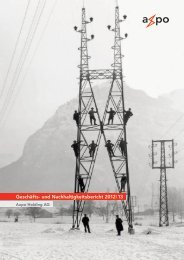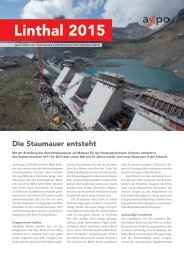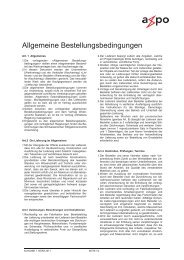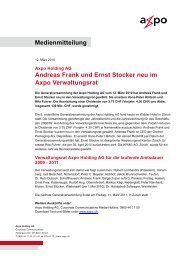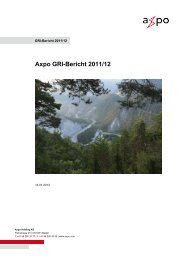Annual report 2008/09 - Axpo Group
Annual report 2008/09 - Axpo Group
Annual report 2008/09 - Axpo Group
You also want an ePaper? Increase the reach of your titles
YUMPU automatically turns print PDFs into web optimized ePapers that Google loves.
Energy market<br />
The global economic crisis during the<br />
<strong>2008</strong>/<strong>09</strong> fi nancial year signifi cantly<br />
changed the global and European energy<br />
markets. These changes concerned<br />
energy prices and the demand for electricity<br />
and primary energy as well as<br />
investments in the energy sector.<br />
Collapse of primary energy and<br />
electricity prices<br />
During the fi rst six months of the<br />
<strong>2008</strong>/<strong>09</strong> fi nancial year, prices for crude<br />
oil, coal and gas at times plunged by<br />
around 50%. The price for CO2 emission<br />
rights in the European emissions trading<br />
system also contracted.<br />
Prices only began to stabilize in<br />
20<strong>09</strong>, albeit at a lower level than before<br />
the fi nancial crisis, when the fi rst<br />
indications that the economic crisis<br />
might be waning appeared in the middle<br />
of the year. Electricity prices did<br />
not fall further, and crude oil became<br />
more expensive again. However, there<br />
has been no indication of any increases<br />
in demand and prices on the electricity<br />
market to date.<br />
Stable demand for electricity<br />
in Switzerland<br />
Gas prices decoupled from oil and fell<br />
substantially, resulting, among other<br />
things, in a reduction in electricity generation<br />
costs in gas- and coal-fi red<br />
power plants, which in turn meant that<br />
prices on the electricity markets<br />
dropped. The main contributor to the<br />
lower electricity prices was shrinking<br />
demand. In France, Germany and Italy,<br />
demand shrank by 1.4%, 2.3% and 5.4%<br />
respectively in the fi rst quarter of the<br />
year under review (International Energy<br />
Agency IEA, 20<strong>09</strong>). This contraction<br />
in demand is mainly due to falling demand<br />
from industry, especially the<br />
steel sector. In Switzerland, however,<br />
electricity demand remained stable,<br />
with end consumption largely on a par<br />
with the previous year. A small dip<br />
was observed in spring, but this was<br />
only partially due to economic effects.<br />
The weather also had an impact. The<br />
deciding factor for the stability of<br />
domestic demand was the steadily growing<br />
demand from private households<br />
and the service sector.<br />
Negative effects on investments<br />
According to IEA studies, the economic<br />
crisis had a threefold negative effect on<br />
investment in the energy sector: fi rstly,<br />
lending policy was stricter, secondly,<br />
project profi tability dropped in view<br />
of lower energy prices, and thirdly, de-<br />
Electricity price trends<br />
EUR/MWh<br />
0 25 50 75 100<br />
0 50 100 150 200<br />
1.7.<strong>2008</strong> 1.10.<strong>2008</strong><br />
1.1.20<strong>09</strong><br />
1.4.20<strong>09</strong><br />
EEX spot price<br />
Crude oil, gas and coal price trends<br />
in CHF<br />
1.7.<strong>2008</strong><br />
1.10.<strong>2008</strong><br />
API No.2 coal price for 2010 delivery (USD/tonne)<br />
Front-month Brent crude oil price (USD/barrel)<br />
TTF gas price, 2010 delivery (EUR/MWh)<br />
Read more about the<br />
demand for electricity at<br />
www.iea.org<br />
1.1.20<strong>09</strong> 1.4.20<strong>09</strong><br />
1.7.20<strong>09</strong><br />
1.7.20<strong>09</strong>





